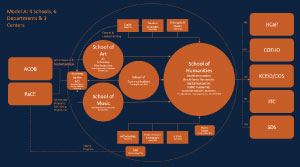Phase II charge:
COLFA stands at a tipping point in which it is poised to assume a leadership role in helping UTSA arrive at its three destinations 1) A model for student success, 2) A great public research university, and 3) An exemplar for strategic growth and innovative excellence) as an outstanding Hispanic Thriving learning and discovery enterprise. Five forcing functions will guide our thinking as we ideate the structure and impact of COLFA as the college of the human experience that studies and seeks to understand what it means to be human, bringing together the multiple perspectives of HISSA.
- Applied: Human experiences differentially shape the impact of social, economic, health and environmental challenges. Disparities and inequities are determined by different experiences, but at the same time generate differential experiences.
- How do we engage across the university and in the community to power research and discovery on society’s most challenging issues?
- How do we become intentional about developing the workplace skills and perspectives that community stakeholders value in our graduates?
- Creativity and Content Creation: The human experience is represented through creative renderings across multiple media including digital, visual and performing arts. Perspectives emerging from the humanities and social sciences, moreover, inform and shape creative renderings in powerful ways.
- How do we best identify and promote integration of the liberal and fine arts with the goal of creating compelling content?
- How do we best equip students to become content creators and to systematically draw on the creative impulses of the liberal and fine arts?
- Digital: The human experience is increasingly impacted by digital transformations. Interactions in the digital space offer a degree of cover that engender new social and interaction practices. New technologies situate and personalize human interaction with digital media. At the same time, digital transformations facilitate the collection of enormous amounts of data that have the potential of generating new insights into human thought and behavior.
- How do we best engage digital transformations both within our disciplines and beyond?
- How do we best equip our students to engage with digital transformations?
- Global: The human experience is shaped by movement and interaction. Real and metaphoric borders invite mobility while also engendering immobility. (Im)mobility and (im)mobilization drive the interactions that make up the human experience.
- How do we best account for the (im)mobilities that shape the human experience from multiple disciplinary perspectives?
- How do we push ourselves and our students to cross borders and boundaries and to learn about others and ourselves in the process?
- Public: Human experiences are represented and metabolized through a variety of media. Public approaches to the human experience seek to amplify and diversify opportunities for critical engagement with disciplinary knowledge and practices.
- How do we best share our disciplinary perspectives with multiple stakeholders in a variety of venues?
- How do we best prepare our students to be ambassadors of disciplinary knowledge and perspectives?
Phase II Committee:
- Andrea Aleman, Political Science and Geography
- Paul Ardoin, Philosophy and Classics
- Richard Armendariz, Art and Art History
- Nazgol Bagheri, Political Science and Geography
- Mark Bayer, English
- Justin Boyd, Southwest School of Art
- Rebecca Bria, Anthropology
- JoAnn Browning, Dean of the College of Engineering and Integrated Design
- Isaac Bustos, Music Lilian Cano, Modern Languages and Literatures
- Whitney Chappell, Modern Languages and Literatures
- Nichole Cherry, Music
- Isaura Contreras Ríos, Modern Languages and Literatures
- Tracy Cowden, Music
- Stacey Davis, Music
- Jennifer Dilley, History
- Gregory Elliot, Art and Art History
- Devin Flaherty, Anthropology
- Jill Fleuriet, Associate Dean for Faculty Success and Associate Dean for the Honors College
- Dean Hendrix, Dean of Libraries
- Annie Herrera, Assistant Dean for Finance and Administration
- Seok Kang, Director of the Center for Digital Initiatives
- Sean Kelly, Dean of the Honors College
- Shamshad Khan, Communication
- Paul Le Blanc, Communication
- Chad Mahood, Communication
- Joycelyn Moody, English
- Juan Mora, Art & Art History
- Sharon Navarro, Political Science and Geography
- Wing Chung Ng, History
- Jessica Nowlin, Philosophy and Classics
- Sonia Saldivar Hull, English
- Chris Sauter, Southwest School of Art
- Scott Sherer, Art and Art History
- Will Smith, Assistant Dean and Director of the Center for Student Excellence
- Jill Sortore, Southwest School of Art
- Ryan Takaba, Southwest School of Art Jon Taylor, Political Science and Geography
- Serife Tekin, Philosophy and Classics
- Libby Rowe, Art and Art History
- David Vance, English
- Kenny Walker, English
- Jason Yaeger, Senior Associate Dean for Research and Graduate Studies Facilitators
Co-conveners:
Glenn Martinez and Nathan Richardson
Project director:
Shannon Heuberger
Project coordinator:
Terri Reynolds
Senior Communication Specialist:
Tricia Schwennesen
Phase II Timeline:
August 4, 2021 Announce kick-off of Phase II and refer colleagues to Phase I documentation
August 16, 2021 Form Phase II committee and send invitations
August 30, 2021 Inaugural Phase II meeting and delivery of charge; college-wide distribution of charge
September 6, 2021 Establish sub-committees and describe parameters of notional models
September 6 through October 25, 2021 Sub-committee meetings
November 1-22, 2021 Dean/Provost review, departmental vetting, and community stakeholder input
February 4, 2022 COLFA Town Hall presenting revised three models
COLFA Tactical Visioning Process: Phase II Report with Notional Models put together by a team of colleagues from within the College of Liberal and Fine Arts, across the university as well as individuals from the Southwest School of Art.
COLFA Tactical Visioning Process: Phase II Revised Models for Consideration
Please send input on the models to Terri.Reynolds@utsa.edu
View the Tactical Visioning Phase II Charge Documents
View the Tactical Visioning Phase II Town Hall Slides
View the Tactical Visioning Phase II Inaugural Meeting Slides


